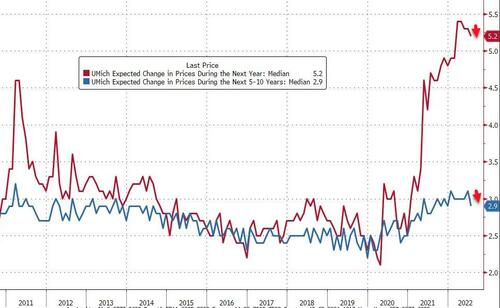UMich Inflation Expectations Rose Intra-Month, Democrats’ Confidence Drops Further
While the headline sentiment index from UMich has tended to make all the headlines historically – since it hit record lows, flashing a big red “pants on fire” indicator for the administration’s insistence that we are not in recession, all eyes have refocused on the inflation expectations sub-component. The preliminary prints showed short- and medium-term inflation expectations slide notably – easing The Fed’s fears (as Powell pointed out this indicator specifically) – we note that the 5-10Y inflation expectation picked up from 2.8% to 2.9% intramonth, while the 1Y inflation expectation held its 5.2% (lower) print…
Source: Bloomberg
“Inflation continued to dominate consumers’ attention, and labor market expectations continued to soften,” Joanne Hsu, director of the survey, said in a statement.
Nearly half of respondents said inflation is weighing on their personal finances, which was exceeded only once before — in 1951.
The year-ahead economic outlook dropped to the lowest level since 2009, Hsu said.
Unemployment expectations deteriorated for the third consecutive month, worsening by 14% from last month and 44% from a year ago, reaching its lowest reading since 2011
So with that out of the way, the final print for July’s UMich sentiment survey rose very modestly intra-month from 51.1 to 51.5 (from record low 50.0 in June), but expectations slipped further to its worst since April 1980…
Source: Bloomberg
Across political cohorts, Democrats’ sentiment weakened further in July while Republicans and Independents saw a modest uptick…
Source: Bloomberg
Buying Conditions improved modestly MoM but weakened intramonth, but still barely off record lows…
Source: Bloomberg
Finally, the lowest income group saw sentiment weaken to near record lows as middle- and high-income cohorts rebounded in July…
Source: Bloomberg
“Consumers are finding ways to cope by altering their spending patterns as high prices persist,” Hsu said. “Going forward, these behavioral adjustments are likely to grow.”
Tyler Durden
Fri, 07/29/2022 – 10:09


Recent Comments